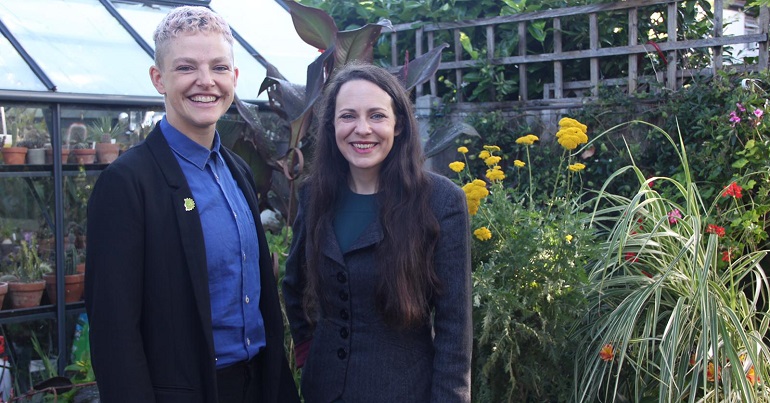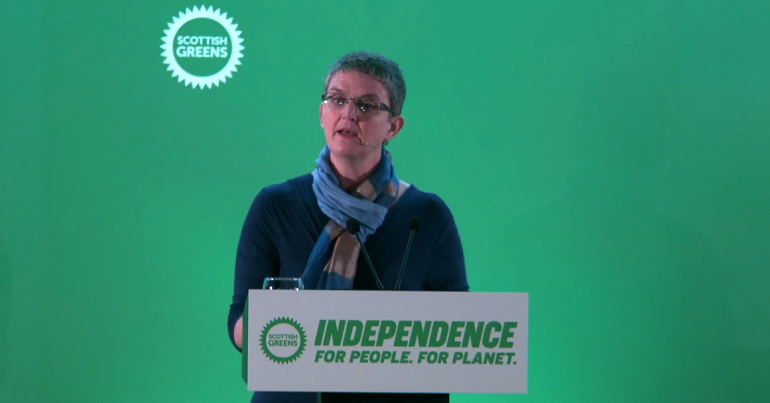Womack and Omond would enable the Greens to transform UK politics

Which party has changed British politics more during the last decade? UKIP, or the Lib Dems? Who had more of an impact, Nigel Farage, or Nick Clegg?
Neither is exactly a flattering comparison for Greens, but the answer, surely, is pretty clear? The Liberal Democrats may have been in government for half of the 2010s, but whatever megre policy gains their cautious approach eeked out of public office, they have been crushed in building-collapse of Brexit and shelled in the culture war that’s come with it.
UKIP chose a very different strategy from the Lib Dems, helping to grab political debate on behalf of reactionaries everywhere. They were clear about what they stood for and didn’t run from a fight, gaining credibility among the voters they focused on and not caring that they enraged the rest of us.
Now, Greens can’t and shouldn’t just plagiarise UKIP’s strategy and apply it to the left: they were inflated by the oligarch-owned tabloid media from England’s deep wells of nationalist mythology.
But the members of the Green Party of England and Wales, as they ponder their current leadership election, should ask themselves how they can change British politics this decade as dramatically as UKIP did in the last. Because the climate crisis means the party can’t wait for the 2030s.
And Greens do have a couple of advantages that UKIP never did. Firstly, while Farage’s party may have appealed strongly to a purple-faced grandad’s army, and may have managed to win over the Brexit waverers, most of the country disagrees with them on most major issues.
This was always their electoral undoing: they may be able to win millions of votes in European elections, but they struggled to find any constituencies where more people would vote for them than actively against them.
There are constituencies across the UK, on the other hand, bursting with the progressive values of the Greens – including every seat the party is targeting. And so for Greens, clearly expressing these values and representing these people as the UKIP wave – now powering the Conservative Party – drags the country into a culture war, doesn’t contradict a strategy to win more MPs. It compliments it.
Likewise, while Greens don’t have the backing of oligarch-owned media, the party does tap into deep roots of social movements, sprouting so much more life than UKIP’s billionaire-funded AstroTurf machines ever could. As Labour vanishes down the plughole in the centre of politics, there is ample opportunity for the Greens to benefit from these connections.
Trans rights
The current leadership election was triggered by a split in the party over what has become an iconic issue of the UK’s raging culture war. This is not, exactly, a split between trans allies and transphobes. Of course there is a faction in the Greens who insist on smearing moral panics about trans people across the internet. But I’m pretty confident they are a small if organised minority.
No, the real split is between trans people and allies, and those who want to ‘unite’ trans people in the party with those transphobes, so the party can get on with talking about something else.
As Siân Berry said to me when she stepped down as leader, this is a moral test. Those who seek to side-step it fail, not as badly but just as surely as those who take the wrong side. But it is also a political test of future leadership.
In response to a growing majority who see the need for a radical transformation of society, people and institutions which quite like the power that society gives them are leading a backlash against a whole succession of minority rights. At the moment, trans people – and, by the way, Gypsy/Travellers – are in the firing line. Who knows who it will be next.
Greens will only be able to draw on the energy of those progressive social movements and enthuse majorities in young, urban target constituencies if they are able to provide moral clarity in leading the charge against these attacks – and whichever ones come next. If people want to vote for quibblers and quislings, there are much more established options available.
One consequence of the alternative – ignoring the right’s moral panic de-jur and hoping it goes away – is easy to work out, because that’s what we did in the 2010s. Only, then, it was migrants. And what we got was Brexit.
Another is the implosion of the party. Because these attacks on minorities won’t go away, until the right decides it’s time to drag politics in another direction once more – likely a Cold War with China. And if younger activists don’t find the party a useful tool for fighting back, then, rightly, they will drift away.
Of course, we do need to stop talking about a progression of moral panics pedalled by the right, and to focus on the challenges we all face, the climate and ecological crises, and the capitalism that’s driving them. But the way to stop this bullying is the same way you stop all bullies: by standing up to them. As Green Peter McColl pointed out to me the other day, it’s worth noting how fast the Tories shut up about their opposition to Black Lives Matter once the England football team told them to piss off.
If Greens are going to transform UK politics in the next decade, it will be by organising people to stand together against the bullies who seek to divide us, and work together to build a future that’s better for us all.
The leadership candidates who are clearest that that’s their plan are Amelia Womack and Tamsin Omond. And that is why I gave them my first preference.
PS. We hope you enjoyed this article. Bright Green has got big plans for the future to publish many more articles like this. You can help make that happen. Please donate to Bright Green now.




Leave a Reply